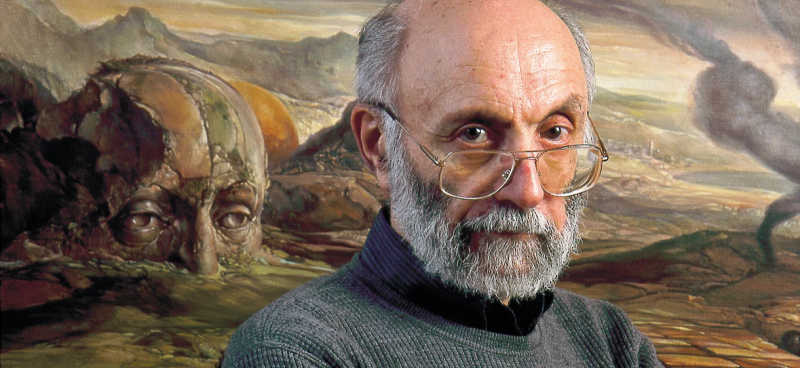Biography
Samuel Bak was born in Vilna, Poland in 1933 at a crucial moment in modern history. From 1940 to 1944, Vilna was under Soviet and then German occupation. Bak’s artistic talent was first recognized during an exhibition of his work in the Ghetto of Vilna when he was nine years old. While he and his mother survived, his father and four grandparents all perished at the hands of the Nazis. At the end of World War II, he fled with his mother to the Landsberg Displaced Persons Camp, where he enrolled in painting lessons at the Blocherer School in Munich. In 1948 they immigrated to the newly established state of Israel. He studied at the Bezalel Art School in Jerusalem and completed his mandatory service in the Israeli army. In 1956 he went to Paris to continue his education at the École des Beaux-Arts. He received a grant from the America-Israel Cultural Foundation to pursue his artistic studies. In 1959, he moved to Rome where his first exhibition of abstract paintings was met with considerable success. In 1961 he was invited to exhibit at the “Carnegie International†in Pittsburgh, followed by solo exhibitions at the Jerusalem and Tel Aviv Museums in 1963.
It was subsequent to these exhibitions that a major change in his art occurred. There was a distinct shift from abstract forms to a metaphysical figurative means of expression. Ultimately, this transformation crystallized into his present pictorial language. Bak’s work weaves together personal history and Jewish history to articulate an iconography of his Holocaust experience. Across seven decades of artistic production, Samuel Bak has explored and reworked a set of metaphors, visual grammar, and vocabulary that ultimately privileges questions. His art depicts a world destroyed, and yet provisionally pieced back together, preserving the memory of the twentieth-century ruination of Jewish life and culture by way of an artistic passion and precision that stubbornly announces the creativity of the human spirit.
Since 1959, the artist has had numerous exhibitions in major museums, galleries, and universities throughout Europe, Israel, and the United States including retrospectives at Yad Vashem Museum in Jerusalem, and the South African Jewish Museum in Cape Town. He has lived and worked in Tel Aviv, Paris, Rome, New York, and Lausanne. In 1993 he settled in Massachusetts and became an American citizen. Bak has been the subject of numerous articles, scholarly works, and eighteen books; most notably a 400-page monograph entitled Between Worlds. In 2001 he published his touching memoir, Painted in Words, which has been translated into several languages. He has also been the subject of two documentary films and was the recipient of the 2002 German Herkomer Cultural Prize. Samuel Bak has received honorary doctorate degrees from: the University of New Hampshire in Durham; Seton Hill University in Greensburg, Pennsylvania; Massachusetts College of Art in Boston; and the University of Nebraska Omaha.

